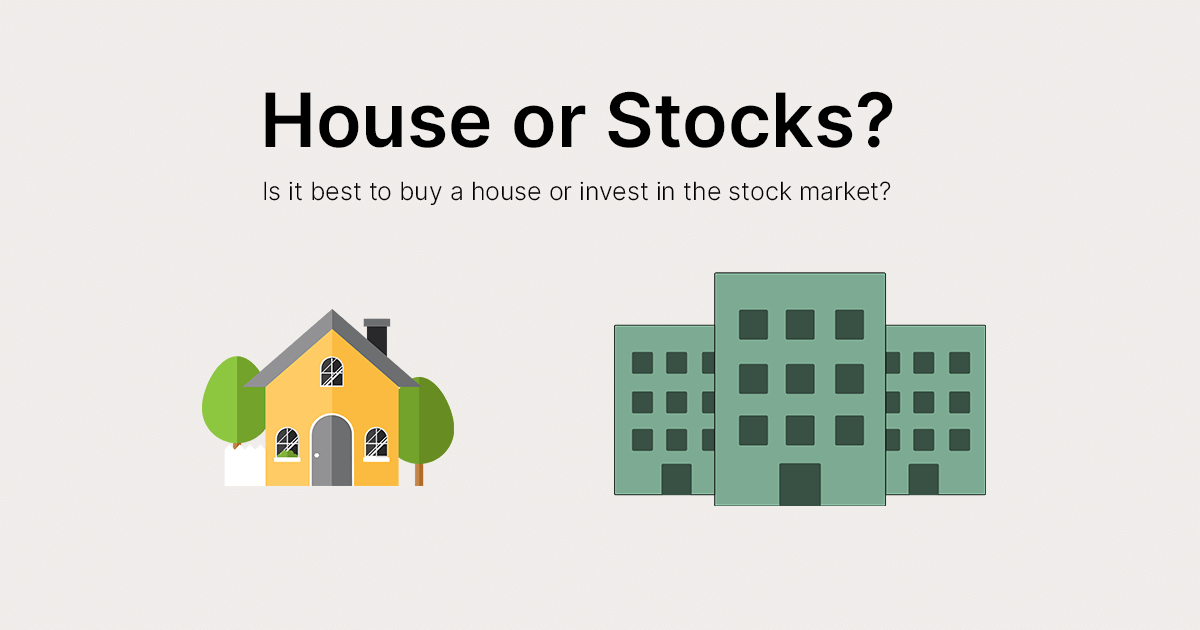Best to Buy a House or Invest in Stocks?
Last updated: Dec 13, 2022

Both have pros and cons, but there can always be a winner for you. The short answer is it depends, but we will take a closer look at everything you need to know before choosing.
I often hear people saying one of them is the best way without showing any calculations or financials to back up their claims.
The truth is there is always going to be uncertainty. And you could end up with the worse decision anyways. But doing proper research, calculations and comparisons will give better decisions overall.
There will always be real estate that is a better investment than the stock market and vice versa.
Typical misconceptions**
“Everyone needs a place to live housing is the best” -
By that logic buying a food company would be the optimal investment in every case. Since people need food more than housing.
Buying stocks equals labor, equipment, research, and many more things of great value.
“You have to pay for rent anyways better to pay yourself with a house” -
Sure, that's true, but you must consider things like if you would rent that out how much would you get?
And could you rent something cheaper than that amount? And what if you would invest the difference in the stock market?
“Stock market is a gamble” -
Sure there's speculation in the stock market. And it's a gamble in the short term. But there's research in it, and index investing is simple. You buy an index fund as soon as you got money, leave it there and DO NOTHING for as long as possible. The entire retirement system is built upon this simple and well-researched strategy. And it does fail, but not in the long term.
If your goal is to make the most money out of an investment, then doing basic math and research is key to your success. Everything can be good if the financials support it.
Real estate vs stock market**
I can't compare everything here for you since it depends on what country you are in and the tax deductions you can have. And most importantly, the price.
And I can never personally know your skills or goals. For example, for someone with handyman skills, it will provide safety in housing. Accounting skills can provide usefulness in stocks.
Real Estate**
Cons:
More work -
In most cases, real estate will require a lot of work and not just initially. Since after you buy the real estate, there will always be needing renovations in the future.
Tenets -
You can never assume it will always be rented out since even professional real estate companies have an average of 90-99%.
And there's a hassle in finding a good tenet or replacing a previous one.
Inflated Prices / Bank Dependent -
House prices are depended on loan terms and interest rates. And their prices are highly inflated because of the ability to take out loans.
If no loans were available, these prices would be a lot lower. Crashes in price are to be expected because of this.
But easy loans can add a leverage effect and add to your profits. But leverage should always be used last as a kind of spice to an already good meal.
Less liquid -
If you want to sell real estate, it will take some time. Making them very hard to liquidate in the short term if needed. I guess you could switch houses every week, still, it wouldn't be worth it in most cases. Think of all the work! And you would probably not find someone willing to pay the price you want so fast.
Harder to diversify -
Since houses are so expensive there is hard to diversify at the beginning. Most people will only own one real estate if any.
Locked in an area -
If you invest in real estate, especially if it's your first you probably need to stick to that place. Moving is not as easy as it once was, at least not without any penalties.
Pros:
Hard asset -
You have a hard asset that you can use. And so will always have value to you no matter what it would sell for. It can even have a lot higher value to you personally. And it can be linked to a higher standard of living because of this.
No experts -
In most cases, you aren't dealing with no pros. Often there are just families that want a completed house. More mispricing and something that needs renovation can be extremely rewarding because of this.
Less psychological pain -
You won't see the price of real estate every day, and it takes more work to sell it. It's often a long-term investment because of this.
The average house ownership is about 16 years compared to the average stock holding time of 5.5 months.
Stocks**
Cons:
Psychological Pain / Problems -
Stock prices are a lot more volatile since they trade every minute. And it hurts more because we see losses or gains and decide to sell out early.
Sure selling a gain isn't as bad as selling a loss but selling a 10% gain instead of a 100% one can be bad. Many other psychological factors make people perform worse in the market.
Herd mentality and many other psychological factors can add to a poorer investment decision in the stock market.
The stock market is also linked to higher suicide rates.
Margin calls / Loaned Assets -
Most companies have some loans and this can make it harder for us to loan money for buying stocks since it adds even more risk. And there is this thing called a margin call that means if an investment account goes down to a certain amount, you have to put money into it or the bank will force sell your stocks or fund.
Making it a realized loss instead of maybe just a short-term one. Margin calls are not a thing for real estate.
Bad short-term -
You could buy it then next month it is already down 30%. If you need the money, you will have to sell it for 30% less even when you just bought it. For just being in the market for one month. 30% is a low probability but far from an impossibility.
No “real asset” -
Stocks can give out a dividend, but in most cases, you can't use the stock/fund for anything. You cant arrange for companies to do what you want or use it for anything personal. You get the most use out of it when you sell.
Gambling -
Because of psychological factors investing in stocks can become a gamble for people. And that is why some gamblers like to buy stocks. I can't tell you how many times people with gambling problems have recommended single stocks to me, and most of the time, they are unprofitable and most likely bought on hype.
Pros:
Easy & Less Work -
With investing in an index fund you are supposed to do nothing. Put your money to work as fast as possible, then do nothing for as long as possible. If you know how to do this, it won't take more than 5 minutes whenever you want to add money to it.
Better returns on total capital -
Stocks win on average over the long run versus most investments. That's why it's so popular, if you have X amount of money it will most likely grow the most in an index fund.
Not counting investments with a leverage effect tho.
Freedom -
You don't need anything or have any responsibilities. You can live where you want. And you only need a device with an internet connection whenever you want to invest.
House Flipping Business**
If you're good at renovating, maybe this can be for you. But remember that that is not enough if you are bad at the financial part. It can still be unprofitable.
I know people who work with construction full time that overpaid for a house with $10 000 just for giggles. That hasn't been sold for at least a year.
Then spent about $10 000 on renovating a house that they want to tear down. Then they procrastinate on the construction of the new house they want to build.
And they are almost all capital in this, about 30% are loans with 6% interest rate.
If you work like this, flipping may be much worse than putting all in an index fund.
But there are very successful people doing this, but most of them have a strategy.
And I can assure you most well strategies involve some leverage and not just holding land.
REITS a combination of both real estate and stocks.**
There is a way to buy stocks that invests in real estate. It's buying real estate but without the hassle.
Even when buying real estate yourself can provide great returns, a REIT will always require less work and maintenance. And depending on the REIT it can even be a better investment.
You need to know what to look for and compare key ratios specific to real estate. And from my experience, some REITs can sometimes be extremely overvalued and provide greatly misleading ratios. For one, you need to understand the difference between a common and a preferred stock.
Housing Prices And Stock Market Correlation**
With real estate, you won't likely feel the drop as you would with stocks. You don't have someone telling you the price of your house every day. But you got that guy in the stock market, making the drop feel a lot more and faster.
But they are often correlated just that they hit differently. The big difference is the stock market moves a lot faster. But it's hard knowing what will hit first. But if one of them goes down the other will likely eventually follow.
If the stock market crashes it can lead to people being incapable to pay off their mortgages. This ends in more foreclosures that then equal a house market crash.
But rent prices don't move that much, so they are reliable even during bad times in the stock market.
House vs stocks calculations**
There is always some speculation in any calculations since we're trying to figure out profits from the future. And unless you have psychic abilities, you can't know for sure.
Nonetheless, our job should be to try to speculate as little as possible.
We should try to calculate our return on investment. Then see how much we get adding to our investment for a compounding effect.
With stock market index investing it's pretty simple to calculate the average. You take the returns of the past, 15, 20, 30, or whatever years' average CAGR returns. CAGR stands for compounded average growth rate and is fairer than just taking the average. It's not a guarantee but you get an idea of what to expect over time.
Real estate is a bit more complex since you have more variables to consider. First off your real estate have probably some loans meaning it's not all your invested capital.
The house area may be better or worse than the average. But I always take the country's average house appreciation and calculate based on that.
Since you're going to pay off your loans every month your leverage effect will decrease over time. Your return on invested capital will most likely also decrease. If you don't have to pay off your loans, that could be great IF you have a fixed/low-interest rate. More debt equals more risk.
Since none of these numbers are exact I try to think that I'm 30% wrong and if I would be happy with that result anyways. That's true for both stocks and real estate.
Conclusion**
The key to whatever you choose is long-term and following a strategy. Both of these strategies are valid and can work.
However, the stock market seems harder for people to pull off since it forces you to have the discipline to stick to the strategy.
With real estate, the bank forces you to pay off your mortgage (re-invest). With the market, you have to do that yourself with your own will. And compounding with re-investments over a long period is very important to your returns.
Where I come from, a house typically costs more than real estate. I'm talking about rent equivalent costs. If you add the costs of electricity and all other utilities and factor in if you rented out the place instead.
But you can typically save much more by renting a cheap apartment.
The stock markets usually win on total capital. If you don't take a loan to buy real estate, then the stock market will likely overperform in the long run. But loans can also add more risks since the bank controls the interest rate. So you have to make sure it's worth it.










